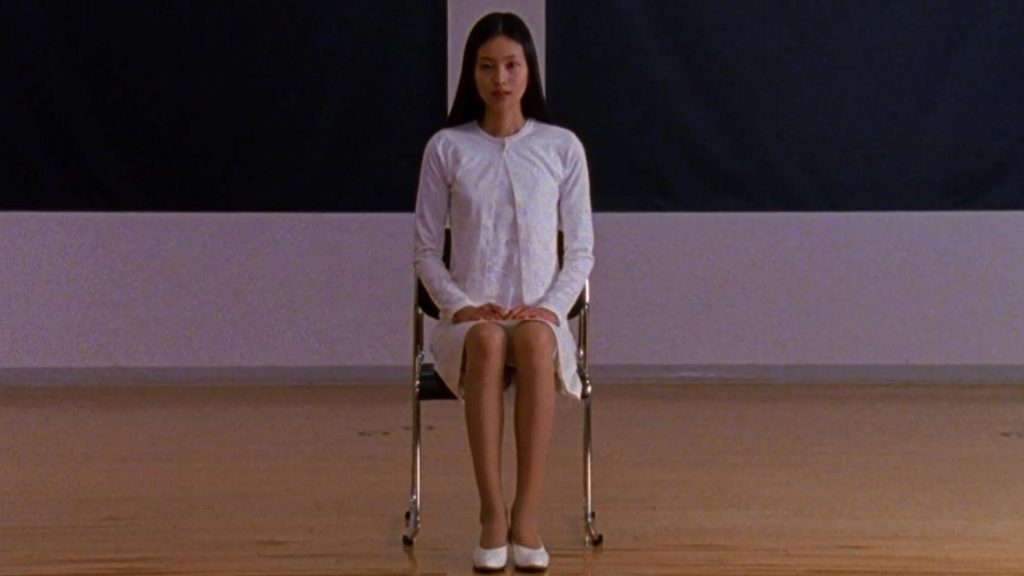Audition
1999

Rating: R
Genre: Drama, Thriller, Horror (Extreme Content)
Country: Japan
Run-Time: 1h 55min
Director: Takashi Miike
Cast
Ryo Ishibashi………..Shigeharu Aoyama
Eihi Shiina………………Asami Yamazaki
Jun Kunimura……..Yasuhisa Yoshikawa
Takashi Miike has made a lot of noteworthy films for fans of horror and gore- Gozu, Ichi the Killer, One Missed Call– but Audition is his masterpiece.
And looking back, you get the sense that Audition, released in 1999, served as a harbinger for things to come in the first few decades of the new millennium. Audition certainly wasn’t the first film to incorporate extreme elements, but it was definitely a film that helped condition us for those directors in the coming decades that would increasingly push extreme elements on a mass audience. It predates the New French Extremity movements shift towards horror and helped to set the stage for a whole host of other directors who would push boundaries with torturous scenes of human horror.
In other words, Audition is one of the films that helped to make the word “extreme” feel a lot less niche when talking about film. It helped to transition extreme content away from rarely seen direct-to-video Guinea Pig inspired films and helped move it to the festival circuit.
Not that the extreme parts of Audition are really all that extreme, especially considering some of Miike’s later works, like Gozu, Visitor Q, and Ichi the Killer. It is just that the way it was presented in Audition caught so many people completely off guard that the film’s reputation has since grown to make the gorey, graphic parts seem so much worse than what is actually put on screen.
Of course, how extreme Audition really is doesn’t really matter and what is extreme it is all subjective anyways. The real reason Audition is so beloved- even if a lot of people believe afterwards that the disturbing parts were blown way out of proportion- is because the film is still great! A lesser film with Audition’s reputation would buckle under the disappointment of viewers who came for some kind of unparalleled gorey spectacle. Trust me. I see this all the time when researching films categorized as “extreme”.
But nobody walks away disappointed by Audition because at the end of the day, all we really want is a good movie.
Audition is the story of a widower named Aoyama (Ryo Ishibashi) who decides he wants to remarry after a conversation with his seventeen year old son. One day, he tells this to a friend, Yoshikawa (Jun Kunimura), who works as a film producer. Yoshikawa, perhaps sensing that Aoyama is going to need some help if he is going to return to the dating scene, devises a plan to hold an audition for a script he has for a rather ridiculous romance that doesn’t actually have any funding and is unlikely to ever get made. All Aoyama has to do is set the parameters for what type of woman he wants to audition and then pick thirty women from the resumes they receive.
And so, he does it. But even before the auditions even begin, Aoyama suspects he has found his dream woman- the twenty-four year old Asami Yamazaki (Eihi Shiina) who included in her resume a letter which detailed her harrowing experience leaving ballot after a career ending injury.
And if you haven’t figured it out by now, there is a lot of disturbing behaviour that speaks of gross abuses of privilege going on in Audition’s plot. That Aoyama and Yamazaki, two men probably in their fifties, think that holding a fake audition just so Aoyama can set up a date is horrible. Aoyama even knows it. Before the auctions begin he even says he “feels like a criminal”.
Then, when the auditions begin, Yamazaki asks some of the girls blatantly inappropriate sexual questions, and even manages to get one of the women to take off her clothes. Yet a lot of the women seem like they have been through this process before, so the scene plays out more like a 1990s romantic comedy, with the men seemingly facing no repercussions for their deceptive and morally reprehensible actions.
That is, until the soft-spoken, graceful Asami shows up. Instantly, Aoyama is smitten; but Yamazaki senses trouble. Take a wild guess whose right!
Miike is patient telling the story, yet Audition never feels boring because the characters feel like genuine people with real histories that he often hints at. Both Aoyama and Asami have pasts that add layers to the story.
But the first sign of real horror, perhaps my favourite scene of the film, is such a dramatic tonal shift from what has come before that it sticks with you. And from there, Miike cranks up the tension.
And it works, because for all his sins, Aoyama genuinely seems like a decent guy. We see that he was by his wife’s side at the end, see him fishing with his son and staying out of the way when he brings a girl to the house. We genuinely want him to be happy.
But Asami is iconic as a horror villain. The white dress and black apron, boots and rubber gloves is a look I’ve actually seen people cosplay. Just add some acupuncture needles and watch the horror fans squirm. The contradiction between the softness in her voice and the ruthlessness of her actions makes her unforgettable. Asami is psycho, but Miike implies that she is psycho with cause. And this also makes her a fascinating, transgressive character- one who challenges Japan’s historical patriarchy and provides consequences to crimes against women that go unseen and unpunished. Aoyama was not chosen as a victim at random.
Though many who discuss Audition focus on the torture, Aoyama’s inspired, surreal drug-induced dreams and there psychological implications are what make Audition so rewatchable. The film has been interpreted in many ways, with some questioning whether or not Asami tortures Aoyama at all. I, personally, wouldn’t go that far in my interpretation, but I have noticed different things after rewatching the ending. At a time when David Lynch was at his height, Miike understood how to put his own spin on that same headtrip style of storytelling. We see it in Gozu, Visitor Q or even his segment from Three Extremes. But Audition employs this technique sparingly, really only sprinkling into the film’s back half and the film as a whole is all better for it.
In Audition, there is a lot of impressive filmmaking on display. Miike even includes an interesting first-person home invasion scene. And considering how the film started, it’s pretty amazing the film ends as it does, yet it all works so well. The tone changes so gradually. It’s brilliant.
Twenty-five years later, Audition is a film that continues to stand the test of time. In fact, the Wienstien scandal gave it a new relevance. Though its lens focuses on the patriarchal abuses in Japan, where gender abuses seem heightened in comparison to the West, it is not hard to still find examples in all societies. Audition is a film that tackles masculine privilege in a subtitle, complex, yet unpretentious way. It really is a special movie.
(On a side note: Audition is number one in my video on the Top Ten Modern Horrors of 1999. How could it not be?)
